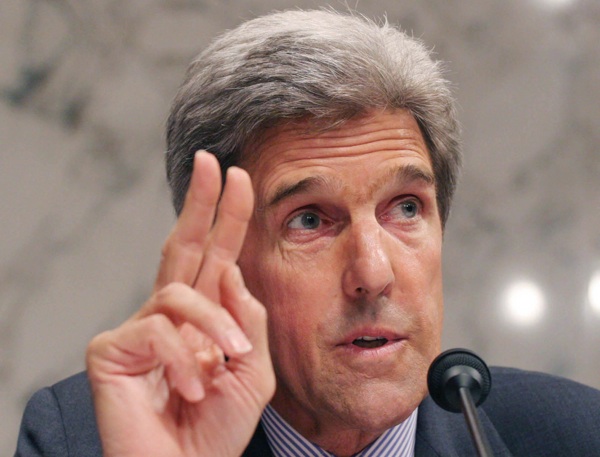Kerry Opens Vigorous Debate on Afghanistan
An eclectic group of experts assessed the nuances of counterinsurgency and troop increases at a panel on Wednesday.
Jul 31, 202073.4K Shares1.1M Views
Sen. John Kerry (D-Mass.) (WDCpix)
Most congressional hearings bring administration officials up for a grilling. Others present interest group-backed pseudo-experts to give canned analysis. Rarely do congressional hearings present eclectic analysts who address a given policy option from a first-principle perspective to an engaged group of lawmakers. Yet that’s exactly what happened Wednesday afternoon when the Senate Foreign Relations Committee began what chairman John Kerry (D-Mass.) described as a series of hearings about the war in Afghanistan.
Illustration by: Matt Mahurin
Kerry assembled three experts to scrutinize the core issues at the heart of the war and the alternatives proposed to wage it: John Nagl, the president of the Center for a New American Security, a think tank that has provided significant personnel and intellectual heft to the Obama administration; Steve Biddle, an influential security expert with the Council on Foreign Relations who advised Gen. Stanley McChrystal’s recent review of Afghanistan strategy; and Rory Stewart, head of the Carr Center for Human Rights Policy at Harvard University, who wrote a widely read travelogue of his journeys through Afghanistan. Intellectual cleavages over both strategy and basic views of the war were apparent on the panel, with Nagl and Biddle supporting a more robustly resourced war with broader aims than Stewart endorsed. But both Nagl and Biddle grappled with the harder implications of such positions, with Nagl emphasizing the primacy of competent Afghan, not U.S., security forces, and Biddle equivocating on the overall importance of Afghanistan to U.S. interests.
This week, President Obama is expected to approve McChrystal’s strategy review, and McChrystal is expected to finalize a palette of options for resourcing the war, including the prospect of U.S. troop increases. Amid rapidly eroding public support for the war, one of the larger concerns roiling lawmakers is whether the counterinsurgency strategy fulsomely embraced by the administration is sufficiently tied to the administration’s stated objectives of eradicating al-Qaeda safe havens in Pakistan and preventing al-Qaeda’s return to Afghanistan. Kerry asked if this week’s successful commando raid in Somalia against an important al-Qaeda-linked figure — launched from offshore bases and requiring no on-land troop presence — might be a model for an alternative strategy.
“Sir, it tells us you can conduct counterterrorism with a light footprint, not counterinsurgency,” Nagl replied. Kerry was unsatisfied with the answer: “That’s exactly my point,” he said. Nagl parried that the presence of neighboring Pakistan was the crucial difference, as the absence of U.S. forces would contribute to the destabilization of Afghanistan’s neighbor, while their presence inspired Pakistani resolve. “I am convinced that American counterinsurgency and counterterrorism in Afghanistan have contributed to the more effective Pakistani counterinsurgency campaign” of the spring, when Pakistani troops finally evicted Taliban insurgents from the Swat valley.
Stewart disagreed, contending that the United States tended to underestimate Afghan and Pakistani will to make decisions in their own interests and overestimated the impact of Afghanistan to Pakistani stability. “It’s very dangerous to mount an argument about Afghanistan based on Pakistan,” he said, comparing weak, poor Afghanistan to a cat and nuclear-armed Pakistan to a tiger. “We’re beating the cat,” Stewart continued, “and when you say, ‘Why are you beating the cat?’ you say, ‘It’s a cat-tiger strategy.’ But you’re beating the cat because you don’t know what to do about the tiger.”
A better strategy, Stewart argued, would be to use special forces to “identify a narrow group of people called al-Qaeda and then eliminate them.”
Later in the hearing, Biddle addressed some of the problems with the so-called “offshore” option, whereby U.S. forces launch the occasional raid, mostly from the skies or with special forces, on selected al-Qaeda targets, dissenting from Stewart’s prescriptions. “Safe havens do not [offer al-Qaeda] real estate for construction of tent farms for training seminars,” he said, but instead they protect al-Qaeda from “human-intelligence penetration on the ground,” upon which such targeted counterterrorism strikes depend. With regard to the drone strikes in Pakistan against al-Qaeda — which the CIA claims has seriously eroded al-Qaeda’s freedom of movement in the tribal areas and which some counterinsurgents fear will ultimately alienate Pakistanis— “control of the government underneath the drones” was an additional prerequisite for success, Biddle said. Take away human intelligence and host-government complicity through an offshoring strategy, and counterterrorism would be a non-starter.
Nagl, an Iraq war veteran and longtime advocate of prosecuting counterinsurgency largely through the cultivation of partner military forces, was agnostic in his remarks about whether to send additional U.S. combat forces to Afghanistan. Instead he advocated, as Sen. Carl Levin (D-Mich.) has proposed, an accelerated deployment of Afghan security forces, and proposed increasing the dedicated U.S. force for training Afghan forces from 4000 to 10,000. Since the U.S. method of training counterinsurgent forces involves mentoring in combat, not academic settings, “No one should think because we’re sending over trainers that we’re not putting them in harm’s way,” Nagl cautioned.
All three panelists agreed on the need to distinguish among what McChrystal has called the “Taliban-led syndicate” of insurgent groups, particularly the small core that fights for ideological conviction and those who fight for more transactional reasons, like money or status. Most insurgents in Afghanistan “are not particularly interested in international terrorism,” Stewart said, and the “small proportion who are don’t have the resources to carry out whatever ambition [is] in their fantasies.”
But Biddle and Nagl responded that such distinctions could not drive splits within the Taliban absent more aggressive fighting and sustained U.S. and Afghan governmental commitment. So-called reconciliation efforts could be successful only “if the military tide begins to turn and perceptions of long-term trajectory” are on the side of the Afghan government, Biddle said. And if the U.S. couldn’t protect defectors from the Taliban coalition from reprisal, “It’s very difficult to convince a ten-dollar Taliban to side with us.”
It was difficult to read the impact the testimony had on the assembled senators. Most, including Kerry, posed skeptical questions to all panelists, indicating a more open debate than the congressional debate over the Iraq war, which often devolved into questioning designed to elicit politically-useful responses. Kerry, for instance, has described the struggle against al-Qaeda as a “global counterinsurgency,” yet he aimed most of his more pointed questions at Nagl, who mostly agrees with that analysis.
Kerry said that Secretary of State Hillary Rodham Clinton had agreed to testify before the panel next month, after President Obama made a decision on whether to send additional troops to Afghanistan. Another hearing, on how to avoid failure in Afghanistan, is scheduled for Thursday morning, when the panel will hear from ret. Gen. Bantz Craddock, the former NATO commander; development expert Clare Lockhart; novelist Khaled Hosseini; and Ryan Crocker, the former U.S. ambassador to Iraq and Pakistan.

Rhyley Carney
Reviewer
Latest Articles
Popular Articles

